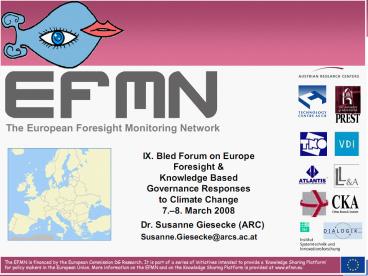Folie 1 - PowerPoint PPT Presentation
1 / 23
Title:
Folie 1
Description:
issuing periodic, analytical Foresight Briefs on key activities and themes ... Water (2003) Cranfield University, ATKINS and Stockholm Environmental Institute ... – PowerPoint PPT presentation
Number of Views:25
Avg rating:3.0/5.0
Title: Folie 1
1
(No Transcript)
2
Elements of EFMN
3
Network of Partners Correspondents
4
Introduction to EFMN Briefs
- issuing periodic, analytical Foresight Briefs on
key activities and themes - provide overview information on recent and
ongoing foresight exercises - offer a show room for foresight exercises
- an opportunity for foresight practitioners to
make their activities more widely known in the
community - build a knowledge database
- Addressees
- policy-makers and
- public administration
- at European (Parliament, Commission) and
- National level (Ministries, funding bodies,
research councils) - interested stakeholders and stakeholder
organizations (industrial associations, NGOs) - researchers and strategists in industry
academic organizations
5
Overview of Briefs by Topics Covered
6
Quest for Additional Briefs
- All topics welcome
- Special interest in
- Portugal
- Israel
- South-Eastern Europe
- Turkey
7
Production of EFMN Briefs
8
Mapping Categories for All Forsights
- Methods used
- Territorial scope
- Common outputs
- Target audience
- Sponsors
- Time horizon
- Participation
9
Mapping Regions
- 1. EU27 (including Norway, Switzerland and
Iceland) - 2. Trans-European (cases with two or more EU
countries) - 3. North America (Canada USA)
- 4. Latin America
- 5. Asia (Eastern, South-Central, South-Eastern
Western) - 6. Africa
- 7. Oceania (Australia New Zealand)
10
Slovenia 5 cases mapped4 cases on levels 2
3top method DelphiMajor territorial scope
NationalMain common outputs Policy
recommendationsMain target audience Government
11
(No Transcript)
12
(No Transcript)
13
(No Transcript)
14
(No Transcript)
15
Europes Top 10 Foresight Methods
16
Wide Range of Foresight Uses
- 1. Assist Business and Industry Strategies
- 2. Assist Policy Decisions
- 3. Build capabilities
- 4. Build Future Visions
- 5. Contribute to Sustainable Economic
Development - 6. Set ST Strategies
- 7. Set ST Priorities
- 8. Promote Public Debate
- 9. Enhance Foresight Awareness and Use
- 10. Evaluate Emerging Technologies
- 11. Identify Barriers of Change
- 12. Identify Opportunities
17
Climate Change Foresight (1)
18
Climate Change Foresight (2)
19
Climate Change Foresight (3)
20
Climate Change Foresight (4)
21
Foresights on Climate Change at EFMN (1)
- United Kingdom
- Scotlands Renewable Energy Potential Beyond 2010
(2003) gvt. Making Space for Water (2005)
Department of Food and Rural Affairs (DEFRA) - Climate Change and Demand for Water (2003)
Cranfield University, ATKINS and Stockholm
Environmental Institute - Climate Change Scenarios for the United Kingdom
(2002) Tyndall Centre for Climate Change Research
and Hadley Centre for Climate Prediction and
Research - Coastal Defence Vulnerability 2075 (2002)
Proudman Oceanographic Laboratory - Global Warming - Looking Beyond Kyoto (2005) Yale
Center for the Study of Globalization - Industrial Sector Carbon Dioxide (2005) Future
Energy Solutions and the Carbon Consortium - Nuclear Energy - The Future Climate (1999) Royal
Society The Royal Academy of Engineering
22
Foresights on Climate Change at EFMN (2)
- Netherlands
- Energy technology (2000) ENGINE-programma van
ECN - Turning the Water Wheel Inside Out. Foresight
Study on Hydrological Science in The
Netherlands (2005) Verkennings Commissie
Hydrologie - Transforming the energy system of the
Netherlands. Two visions on reaching 80 percent
emissions reduction by 2050 (2002) Nationaal
Onderzoeksprogramma Mondiale Luchtverontreiniging
en Klimaatverandering (NOP) - Climate Options for the Long term (COOL)
Stakeholders' views on 80 percent emission
reduction (2002) Earthscan - Energy in the 21th Century (2004) Wiardi Beckman
Stichting - Sectorale CO2-emissies tot 2010 Update
Macro-economic effects in 2020 of the Kyoto
climate policy (2004) RIVM/ECN
23
Foresights on Climate Change at EFMN (3)
AustraliaReview of Wind Energy opportunities in
Australia and regional markets (1999) Austenergy
Denmark The future Danish energy system (2006)
gvt.
Finland Finland's National Adaptation
Strategy (2003) Ministry of Agriculture and
Forestry and other Ministries
United States US Energy Scenarios for the 21st
Century (2002) Global Business Network
Ireland Energy Scenarios Ireland (2005) FEASTA -
The Foundation for the Economics of
Sustainability
India Renewable Energy Sources - Future
Prospects for Developing Countries (2004) TERI,
IPCC
Additional information www.efmn.eu































